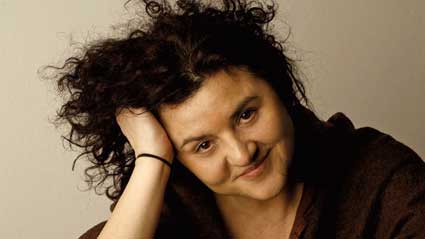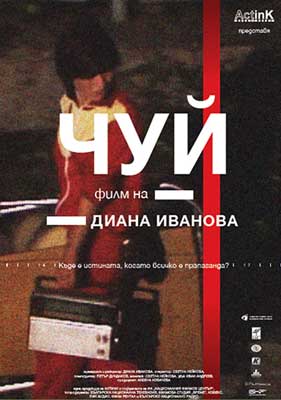On November 14, the Cinemania film festival in Sofia will screen the documentary "Listen" of Bulgarian journalist Diana Ivanova. Quarter of a century after the start of the democratic changes in this country, it takes us back to the history and role of Radio Free Europe in this process. Why was the US-opened media in West Germany considered one of the most dangerous enemies of communism and what helped it become a source of information and alternative views for generations of Bulgarians?
 "The film tells the personal stories of three women who share in a very emotional manner what Radio Free Europe meant to them and their families”, says in an interview for Radio Bulgaria Diana Ivanova. “Radio Free Europe filled a gap resulting from the lack of truth and lack of facts. I was born in 1968 and I didn't listen to it a lot as until 1986 my family lived in Mihailovgrad and we didn't have good reception at home. But I remember that the first information about the Chernobyl accident came from Radio Free Europe, it was transmitted on the air and that's how we found out about it. So on the one hand, Radio Free Europe was a place where you could hear another point of view that would make you reflect on things. This perspective might not be always the same as yours, it might not always be the right one or the correct one, but somehow the radio gave another interpretation, purely intellectual, if you will, to what was happening, handling huge data sources that were not allowed here. "
"The film tells the personal stories of three women who share in a very emotional manner what Radio Free Europe meant to them and their families”, says in an interview for Radio Bulgaria Diana Ivanova. “Radio Free Europe filled a gap resulting from the lack of truth and lack of facts. I was born in 1968 and I didn't listen to it a lot as until 1986 my family lived in Mihailovgrad and we didn't have good reception at home. But I remember that the first information about the Chernobyl accident came from Radio Free Europe, it was transmitted on the air and that's how we found out about it. So on the one hand, Radio Free Europe was a place where you could hear another point of view that would make you reflect on things. This perspective might not be always the same as yours, it might not always be the right one or the correct one, but somehow the radio gave another interpretation, purely intellectual, if you will, to what was happening, handling huge data sources that were not allowed here. "
 In Diana Ivanova's opinion, Radio Free Europe, in a purely emotional manner, was changing lives - even the lives of teenagers, people who in in the 1960s and 1970s were listening to music on its airwaves. "It gives different things to different generations. But this emotion that I felt was exceptional. And I wanted to be able to transmit it to my audience now through the film because it has led people to make a new choice in their lives later," said the journalist. And more: "Radio Free Europe had another very strong period in the 1990s. Then was the crisis in the government of Zhan Videnov as Bulgaria was sinking down. In this period the radio again played a very important role because it brought together a team of highly talented journalists, each with their own opinion. It did not serve any economic grouping and it gradually became clear that Bulgaria was parcelled into separate spheres of influence. The radio could afford the courage to be a critical observer of all this, but also to seek positive examples, to compare processes with other countries in the post-socialist transition."
In Diana Ivanova's opinion, Radio Free Europe, in a purely emotional manner, was changing lives - even the lives of teenagers, people who in in the 1960s and 1970s were listening to music on its airwaves. "It gives different things to different generations. But this emotion that I felt was exceptional. And I wanted to be able to transmit it to my audience now through the film because it has led people to make a new choice in their lives later," said the journalist. And more: "Radio Free Europe had another very strong period in the 1990s. Then was the crisis in the government of Zhan Videnov as Bulgaria was sinking down. In this period the radio again played a very important role because it brought together a team of highly talented journalists, each with their own opinion. It did not serve any economic grouping and it gradually became clear that Bulgaria was parcelled into separate spheres of influence. The radio could afford the courage to be a critical observer of all this, but also to seek positive examples, to compare processes with other countries in the post-socialist transition."
Diana Ivanova worked at Radio Free Europe until 2003. For making the film, she examined many archives of the radio. What impressed her the most?
"What most impressed me from the archives are interviews from 1989. They were made mainly by Rumiana Uzunova but also by her colleagues who helped her to make them. She was not alone but she was part of a huge team. There are shockingly strong interviews with displaced Bulgarian Turks /during the so-called Revival Period/ and with people who were then scattered throughout the country and no other media was interested in them. I was very impressed by the conduct of Rumiana Uzunova herself - very humane and empathic with the way she listened to people: I hear you, I sympathize with your feelings. She does not ask questions. And this is what I'd like to be heard in the film. That's why the title “Listen” comes from the power of those words that she says. How much power there is in these words, "Listen" and "I am listening to you” when it is said with absolute humanity."
The other thing that impressed Diana Ivanova were the propaganda films for the radio from the 1960s and 1970s, and the late 1989. One example - a Bulgarian returns to the country frustrated by the West, and indeed he was commissioned to return from the state security, but the Bulgarian audience has never understood that. Part of the film is also a preserved interrogation with dissident poet Petar Manolov of 1989 about what one can say on the air of "Free Europe", which at that time one could not say elsewhere. The documentary presents the views of both the audience and the journalists, employees of the state security, secret agents, American directors. "And in the confrontation of these different worlds I leave the viewers to see and feel for themselves and understand that period. It was important for me to leave the archives speak for themselves. In this movie my voice is not present, it's a story told solely by the people and the archives”, Diana Ivanova concluded.
English Rossitsa Petcova
“A story that is worthy of a movie” is what we often say when we hear about some incredible event or an interesting story. It is cinema that seems to help today's digitally dependent person, for whom the magical worlds of paper books..
After the success of the "We are the children of the river" festival in September, a civic foundation is once again collaborating with the Plovdiv City Centre Municipality. This time they have organised an exhibition of the same name, featuring..
The Gala Concert of the National Ballet of El Salvador will take place today at 16.00 in the State Opera House in Stara Zagora as part of the programme of the 54th International Festival of Opera and Ballet Arts . The founder and director of..
The Bulgarian film "Tarika" , directed by Milko Lazarov, won the Best Film award in the international competition category at the 30th Kolkata..
Bulgarian actress Maria Bakalova has appeared on the cover of Vogue CS . ‘’ One of my biggest dreams just came true. I’m so overexcited to share with..

+359 2 9336 661
